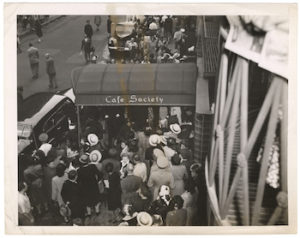
Café Society
*On this date in 1938, Café Society opened. This was a New York City nightclub at Sheridan Square in Greenwich Village.
Managed by Jewish white-American Barney Josephson, it was created to showcase Black talent and to be an American version of the political cabarets he had seen in Europe. Café Society was one of the first racially integrated nightclubs in the United States; Josephson also intended the club to defy the pretenses of the rich; he chose the name to mock Clare Boothe Luce and what she referred to as "café society," the habitués of more upscale nightclubs. He also advertised the club as "The Wrong Place for the Right People." Josephson opened a second branch on 58th Street, between Lexington and Park Avenue, in 1940.
The club also prided itself on treating Black and white customers equally, unlike many venues, such as the Cotton Club, that featured Black performers but discouraged Black customers except for prominent Blacks in the entertainment industry. The club featured many of the greatest Black musicians of the day from different backgrounds, often presented with an intensely political set.
Billie Holiday first sang "Strange Fruit" there; at Josephson's insistence, she closed her set with this song, leaving the stage without taking any encores so that the audience would be left to think about the song's meaning. Lena Horne was persuaded to stop singing "When It's Sleepy Time Down South," Pearl Bailey was fired for being "too much of an Uncle Tom," and Carol Channing was fired for an impersonation of Ethel Waters.
Relying on John Hammond, the club's "unofficial music director," Josephson helped launch the careers of Ruth Brown, Lena Horne, dancer Pearl Primus, Hazel Scott, Pete Johnson, Albert Ammons, Big Joe Turner, and Sarah Vaughan and popularized gospel groups such as the Dixie Hummingbirds and the Golden Gate Quartet among white audiences.
These acts were first presented at Hammond's Carnegie Hall concerts, From Spirituals to Swing, in 1938 and 1939. Its defining star in the early 1940s was Josh White, who first appeared with a gospel group, the Carolinians, then headed the bill as a solo performer for four years. As part of the 20th-century challenge to integrate America's segregated society, Café Society was the scene of numerous political events and fundraisers, often for left-wing causes, both during and after World War II.
In 1947, Josephson's brother Leon Josephson was subpoenaed by the House Committee on Un-American Activities, which led to hostile comments from columnists Westbrook Pegler and Walter Winchell. Business dropped sharply, and the club closed the following year. On December 5, 1948, dancer Pearl Primus closed a successful return engagement before heading off for a year's research in Africa as a Rosenwald Fellow.
Greenwich Village Society for Historic Preservation.org
Image: International Ctr. of Photography